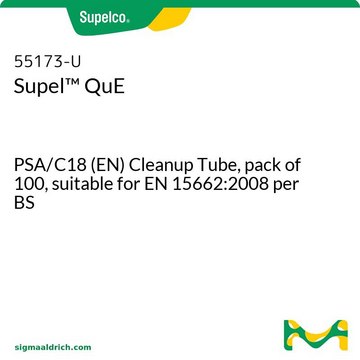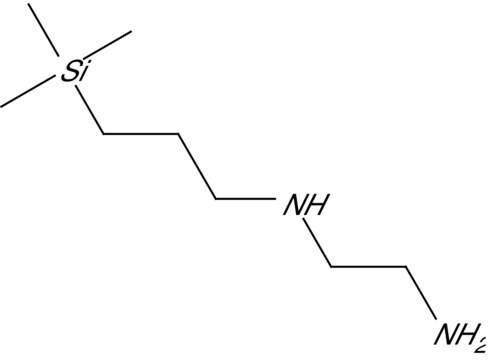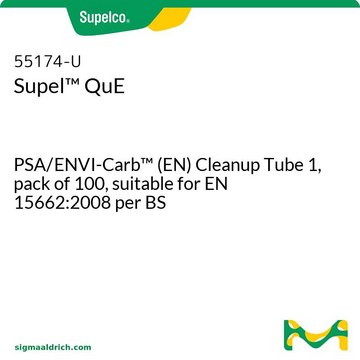55288-U
Supel™ QuE QuEChERS tube
PSA/C18 Tube, pack of 100, AOAC® 2007.01
Synonym(s):
QuEChERS
About This Item
Recommended Products
product name
Supel™ QuE, PSA/C18 Tube, pack of 100, AOAC® 2007.01
material
polypropylene tube
Agency
AOAC® 2007.01
product line
Supel™
composition
Discovery® DSC-18, 50 mg
magnesium sulfate, 150 mg
Supelclean PSA, 50 mg
packaging
pack of 100
technique(s)
QuEChERS: suitable
centrifuge tube volume
2 mL
matrix active group
C18 phase
PSA phase
application(s)
food and beverages
Looking for similar products? Visit Product Comparison Guide
Related Categories
General description
Using the QuEChERS method, food/agricultural samples are first extracted with an aqueous miscible solvent (e.g., acetonitrile) in the presence of high amounts of salts (e.g., sodium chloride and magnesium sulfate) and/or buffering agents (e.g. citrate) to induce liquid phase separation and stabilize acid and base labile pesticides, respectively. Upon shaking and centrifugation, an aliquot of the organic phase is subjected to further cleanup using SPE. Unlike traditional methods using SPE tubes, in dispersive SPE, cleanup is facilitated by mixing bulk amounts of SPE (e.g., Supelclean PSA, ENVI-Carb, and/or Discovery DSC-18) with the extract. After sample cleanup, the mixture is centrifuged and the resulting supernatant can either be analyzed directly or can be subjected to minor further treatment before analysis.
Supelco carries a line of vials and centrifuge tubes containing pre-determined amounts of salts and SPE sorbents to support the most common method configurations used today.
Legal Information
Storage Class Code
13 - Non Combustible Solids
WGK
WGK 3
Flash Point(F)
Not applicable
Flash Point(C)
Not applicable
Choose from one of the most recent versions:
Already Own This Product?
Find documentation for the products that you have recently purchased in the Document Library.
Customers Also Viewed
Articles
The comparison of Supel™ QuE Z-Sep/C18, PSA/C18, and PSA QuEChERS sorbents, in terms of color removal and analyte recovery, is described for the cleanup of oranges prior to pesticide analysis.
Determination of Neonicotinoids in Honey using a Chromolith RP-18 HPLC column and UV Detection
Protocols
Honey bee exposure to neonicotinoid pesticides could contribute to colony collapse disorder (CCD). This application utilizes QuEChERS Extraction and LC-MS Analysis.
LC/MS/MS Analysis of Neonicotinoid Pesticides in Dandelion Blossoms on Ascentis® Express C18 after Dispersive SPE (QuEChERS) using Supel™ QuE
On Friday, April 27, 2018, the European Union decided to ban the use of three neonicotinoid insecticides from use on field crops, having deemed them dangerous to bees. This application demonstrates the analysis of these banned compounds and others from dandelion blossoms using QuEChERS and LC-MS.
Related Content
QuEChERs is a solid phase extraction (SPE) technique for sample preparation. Supelco's innovative Z-Sep and Z-Sep+ sorbents demonstrated here extract more fat and pigment than traditional PSA/C18 phases while showing greater analyte recovery and greater reproducibility.
Chromatograms
application for HPLCapplication for HPLC, application for SPEOur team of scientists has experience in all areas of research including Life Science, Material Science, Chemical Synthesis, Chromatography, Analytical and many others.
Contact Technical Service








